Emotional Intelligence in Leadership and Business Objectives Report
VerifiedAdded on 2023/04/20
|7
|1167
|135
Report
AI Summary
This report delves into the significance of emotional intelligence (EI) in leadership and its impact on various aspects of business. It explores how to manage personal emotions to understand and identify the feelings of employees, emphasizing the importance of self-awareness, control, empathy, and adaptability. The report examines how knowledge of learning styles, personality, and communication styles aids in understanding employees better, and how to use one's own feelings to satisfy emotional needs. It further discusses the relationship between emotionally effective people and the attainment of business objectives, including the application of EI in sales, marketing, and HR. The emotional impact of decision-making is analyzed, along with policies and legislation that enable managing emotions in the workplace. The report also includes an appendix outlining a coaching phase, demonstrating practical applications of EI principles, and concludes with a list of references.
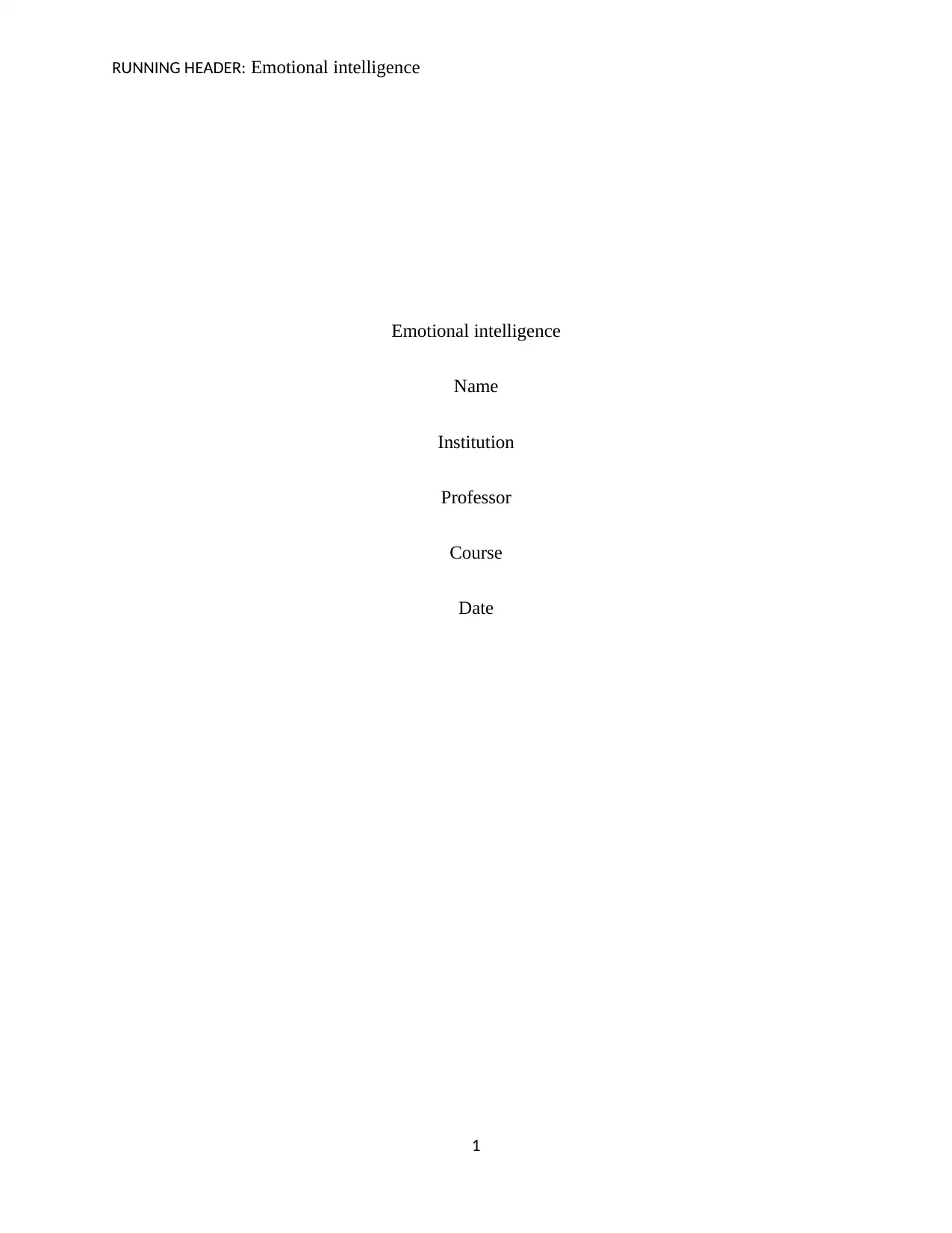
RUNNING HEADER: Emotional intelligence
Emotional intelligence
Name
Institution
Professor
Course
Date
1
Emotional intelligence
Name
Institution
Professor
Course
Date
1
Paraphrase This Document
Need a fresh take? Get an instant paraphrase of this document with our AI Paraphraser
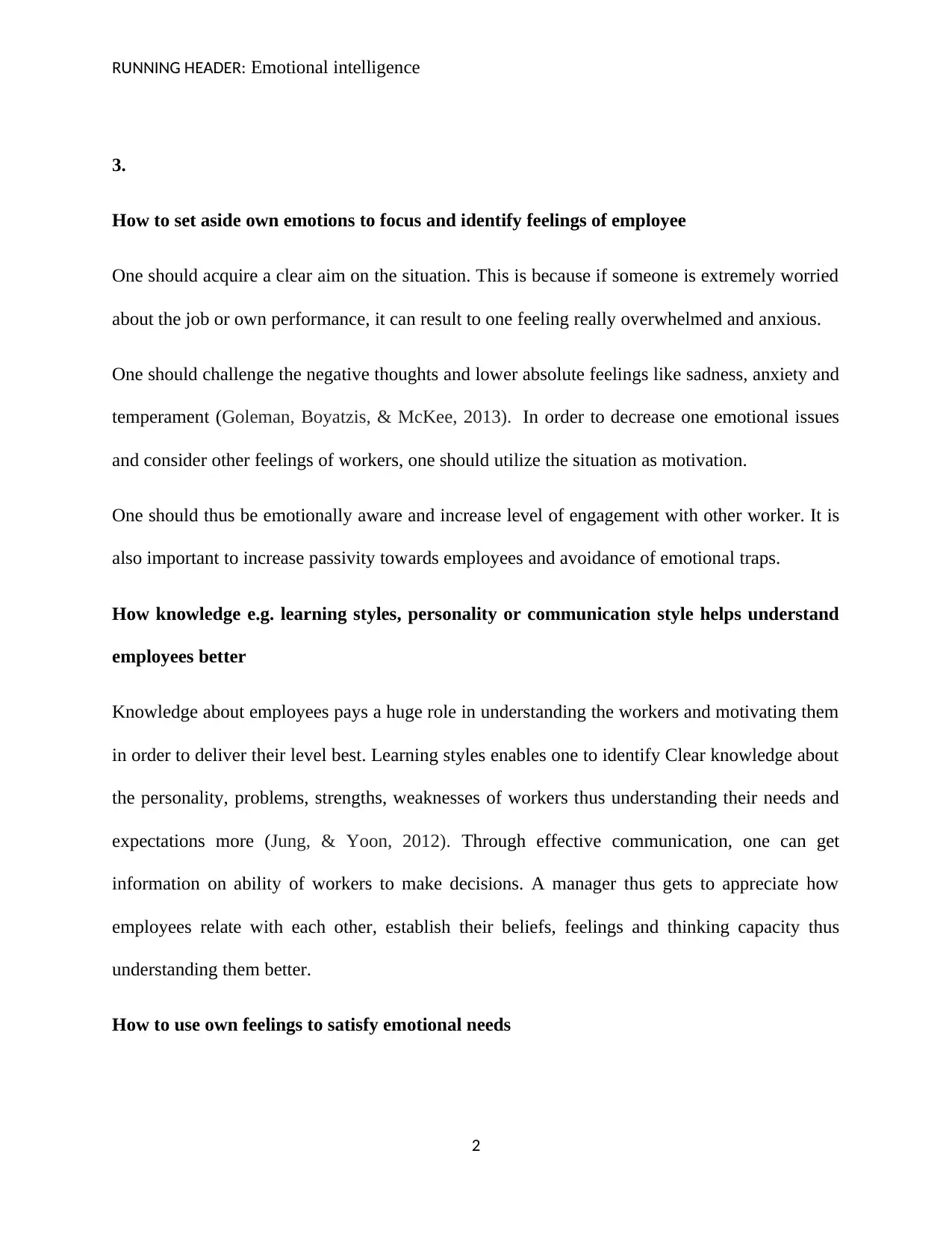
RUNNING HEADER: Emotional intelligence
3.
How to set aside own emotions to focus and identify feelings of employee
One should acquire a clear aim on the situation. This is because if someone is extremely worried
about the job or own performance, it can result to one feeling really overwhelmed and anxious.
One should challenge the negative thoughts and lower absolute feelings like sadness, anxiety and
temperament (Goleman, Boyatzis, & McKee, 2013). In order to decrease one emotional issues
and consider other feelings of workers, one should utilize the situation as motivation.
One should thus be emotionally aware and increase level of engagement with other worker. It is
also important to increase passivity towards employees and avoidance of emotional traps.
How knowledge e.g. learning styles, personality or communication style helps understand
employees better
Knowledge about employees pays a huge role in understanding the workers and motivating them
in order to deliver their level best. Learning styles enables one to identify Clear knowledge about
the personality, problems, strengths, weaknesses of workers thus understanding their needs and
expectations more (Jung, & Yoon, 2012). Through effective communication, one can get
information on ability of workers to make decisions. A manager thus gets to appreciate how
employees relate with each other, establish their beliefs, feelings and thinking capacity thus
understanding them better.
How to use own feelings to satisfy emotional needs
2
3.
How to set aside own emotions to focus and identify feelings of employee
One should acquire a clear aim on the situation. This is because if someone is extremely worried
about the job or own performance, it can result to one feeling really overwhelmed and anxious.
One should challenge the negative thoughts and lower absolute feelings like sadness, anxiety and
temperament (Goleman, Boyatzis, & McKee, 2013). In order to decrease one emotional issues
and consider other feelings of workers, one should utilize the situation as motivation.
One should thus be emotionally aware and increase level of engagement with other worker. It is
also important to increase passivity towards employees and avoidance of emotional traps.
How knowledge e.g. learning styles, personality or communication style helps understand
employees better
Knowledge about employees pays a huge role in understanding the workers and motivating them
in order to deliver their level best. Learning styles enables one to identify Clear knowledge about
the personality, problems, strengths, weaknesses of workers thus understanding their needs and
expectations more (Jung, & Yoon, 2012). Through effective communication, one can get
information on ability of workers to make decisions. A manager thus gets to appreciate how
employees relate with each other, establish their beliefs, feelings and thinking capacity thus
understanding them better.
How to use own feelings to satisfy emotional needs
2
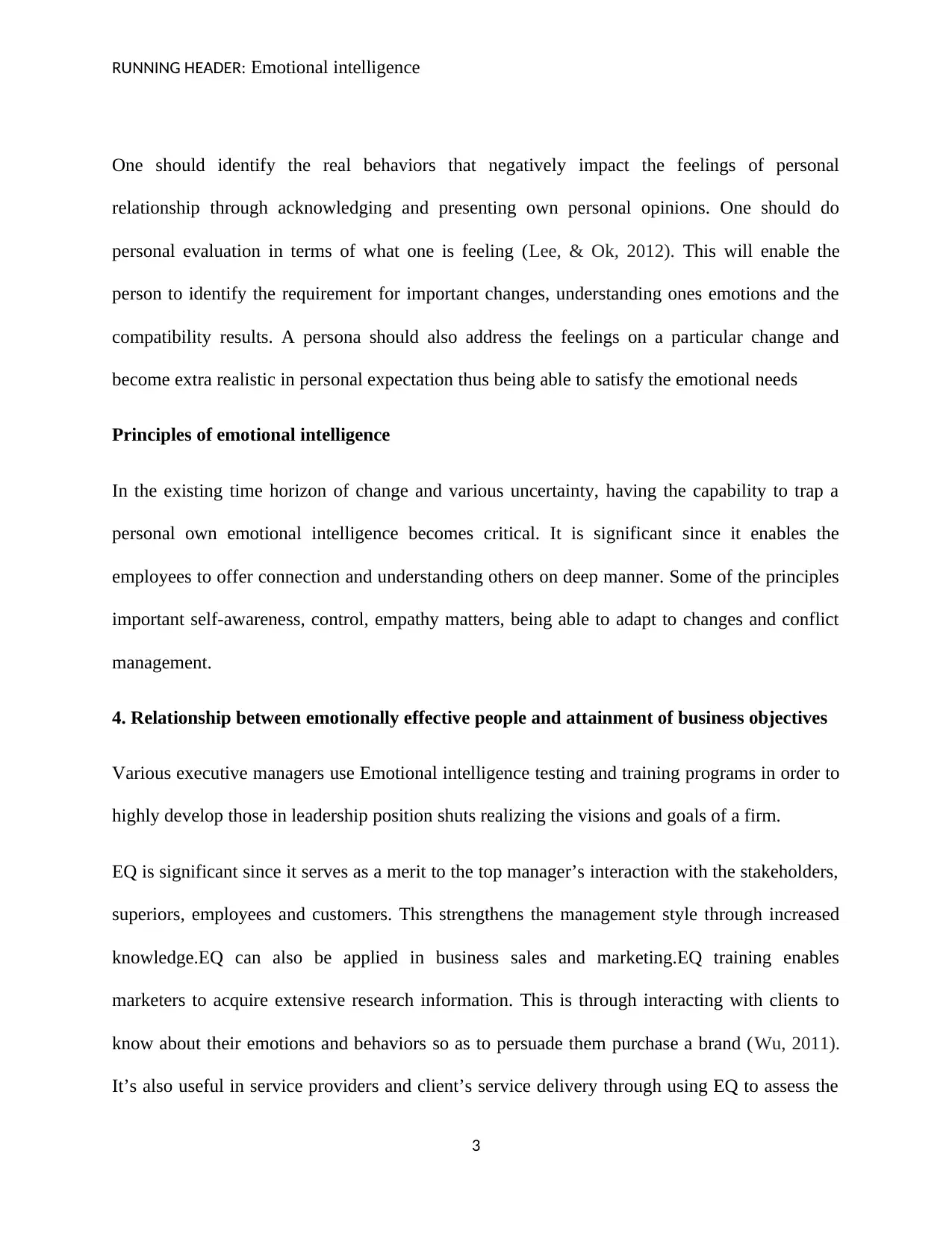
RUNNING HEADER: Emotional intelligence
One should identify the real behaviors that negatively impact the feelings of personal
relationship through acknowledging and presenting own personal opinions. One should do
personal evaluation in terms of what one is feeling (Lee, & Ok, 2012). This will enable the
person to identify the requirement for important changes, understanding ones emotions and the
compatibility results. A persona should also address the feelings on a particular change and
become extra realistic in personal expectation thus being able to satisfy the emotional needs
Principles of emotional intelligence
In the existing time horizon of change and various uncertainty, having the capability to trap a
personal own emotional intelligence becomes critical. It is significant since it enables the
employees to offer connection and understanding others on deep manner. Some of the principles
important self-awareness, control, empathy matters, being able to adapt to changes and conflict
management.
4. Relationship between emotionally effective people and attainment of business objectives
Various executive managers use Emotional intelligence testing and training programs in order to
highly develop those in leadership position shuts realizing the visions and goals of a firm.
EQ is significant since it serves as a merit to the top manager’s interaction with the stakeholders,
superiors, employees and customers. This strengthens the management style through increased
knowledge.EQ can also be applied in business sales and marketing.EQ training enables
marketers to acquire extensive research information. This is through interacting with clients to
know about their emotions and behaviors so as to persuade them purchase a brand (Wu, 2011).
It’s also useful in service providers and client’s service delivery through using EQ to assess the
3
One should identify the real behaviors that negatively impact the feelings of personal
relationship through acknowledging and presenting own personal opinions. One should do
personal evaluation in terms of what one is feeling (Lee, & Ok, 2012). This will enable the
person to identify the requirement for important changes, understanding ones emotions and the
compatibility results. A persona should also address the feelings on a particular change and
become extra realistic in personal expectation thus being able to satisfy the emotional needs
Principles of emotional intelligence
In the existing time horizon of change and various uncertainty, having the capability to trap a
personal own emotional intelligence becomes critical. It is significant since it enables the
employees to offer connection and understanding others on deep manner. Some of the principles
important self-awareness, control, empathy matters, being able to adapt to changes and conflict
management.
4. Relationship between emotionally effective people and attainment of business objectives
Various executive managers use Emotional intelligence testing and training programs in order to
highly develop those in leadership position shuts realizing the visions and goals of a firm.
EQ is significant since it serves as a merit to the top manager’s interaction with the stakeholders,
superiors, employees and customers. This strengthens the management style through increased
knowledge.EQ can also be applied in business sales and marketing.EQ training enables
marketers to acquire extensive research information. This is through interacting with clients to
know about their emotions and behaviors so as to persuade them purchase a brand (Wu, 2011).
It’s also useful in service providers and client’s service delivery through using EQ to assess the
3
⊘ This is a preview!⊘
Do you want full access?
Subscribe today to unlock all pages.

Trusted by 1+ million students worldwide
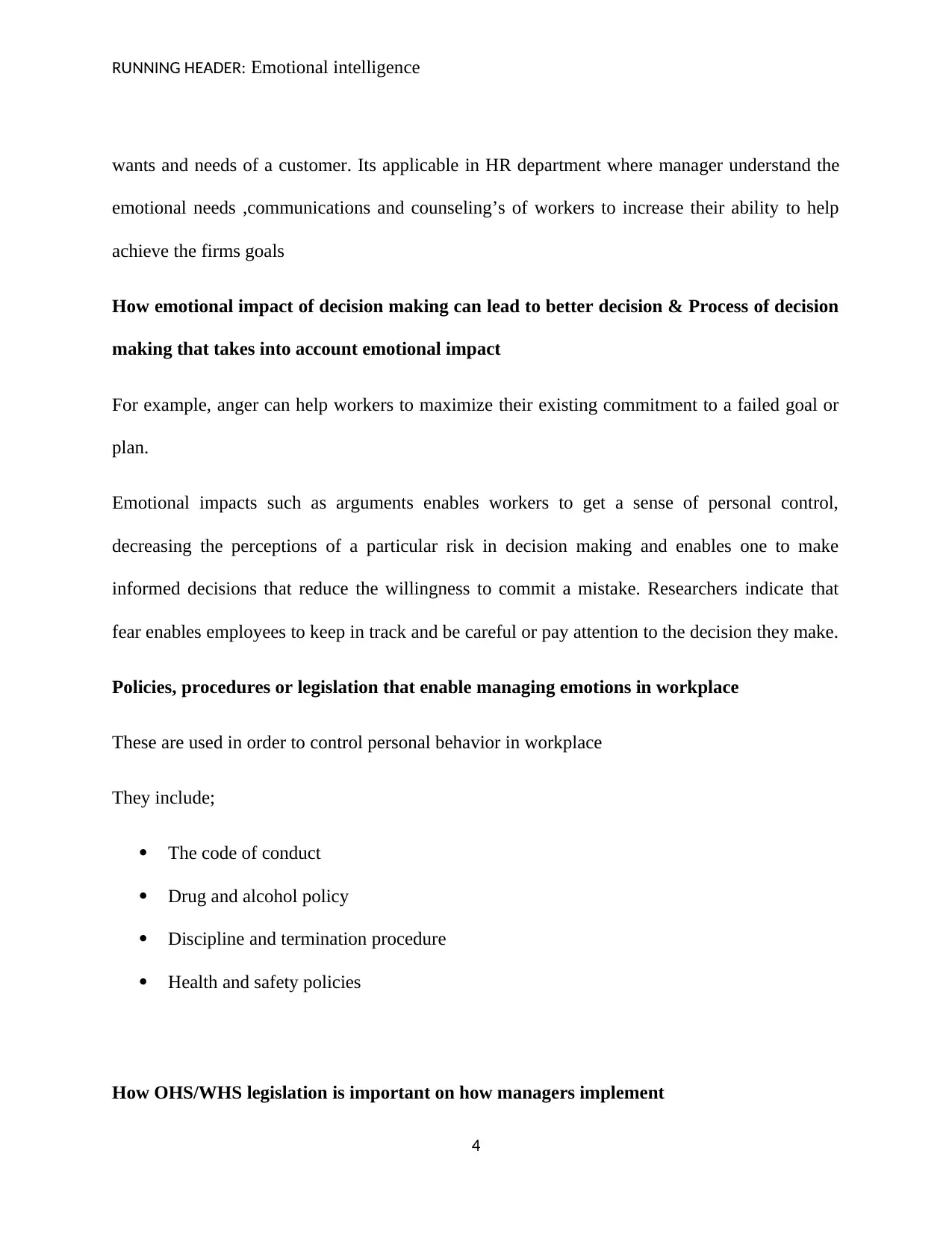
RUNNING HEADER: Emotional intelligence
wants and needs of a customer. Its applicable in HR department where manager understand the
emotional needs ,communications and counseling’s of workers to increase their ability to help
achieve the firms goals
How emotional impact of decision making can lead to better decision & Process of decision
making that takes into account emotional impact
For example, anger can help workers to maximize their existing commitment to a failed goal or
plan.
Emotional impacts such as arguments enables workers to get a sense of personal control,
decreasing the perceptions of a particular risk in decision making and enables one to make
informed decisions that reduce the willingness to commit a mistake. Researchers indicate that
fear enables employees to keep in track and be careful or pay attention to the decision they make.
Policies, procedures or legislation that enable managing emotions in workplace
These are used in order to control personal behavior in workplace
They include;
The code of conduct
Drug and alcohol policy
Discipline and termination procedure
Health and safety policies
How OHS/WHS legislation is important on how managers implement
4
wants and needs of a customer. Its applicable in HR department where manager understand the
emotional needs ,communications and counseling’s of workers to increase their ability to help
achieve the firms goals
How emotional impact of decision making can lead to better decision & Process of decision
making that takes into account emotional impact
For example, anger can help workers to maximize their existing commitment to a failed goal or
plan.
Emotional impacts such as arguments enables workers to get a sense of personal control,
decreasing the perceptions of a particular risk in decision making and enables one to make
informed decisions that reduce the willingness to commit a mistake. Researchers indicate that
fear enables employees to keep in track and be careful or pay attention to the decision they make.
Policies, procedures or legislation that enable managing emotions in workplace
These are used in order to control personal behavior in workplace
They include;
The code of conduct
Drug and alcohol policy
Discipline and termination procedure
Health and safety policies
How OHS/WHS legislation is important on how managers implement
4
Paraphrase This Document
Need a fresh take? Get an instant paraphrase of this document with our AI Paraphraser
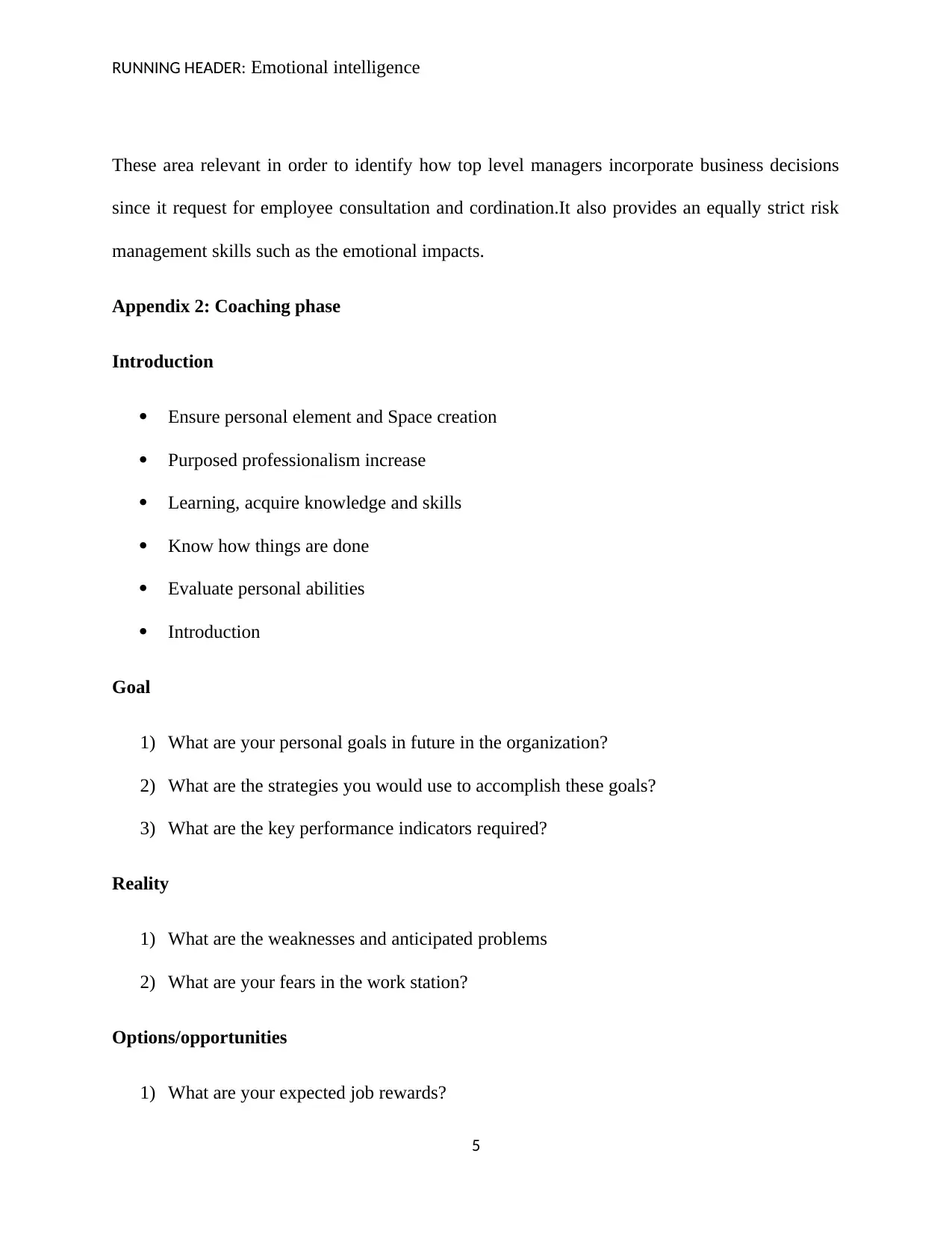
RUNNING HEADER: Emotional intelligence
These area relevant in order to identify how top level managers incorporate business decisions
since it request for employee consultation and cordination.It also provides an equally strict risk
management skills such as the emotional impacts.
Appendix 2: Coaching phase
Introduction
Ensure personal element and Space creation
Purposed professionalism increase
Learning, acquire knowledge and skills
Know how things are done
Evaluate personal abilities
Introduction
Goal
1) What are your personal goals in future in the organization?
2) What are the strategies you would use to accomplish these goals?
3) What are the key performance indicators required?
Reality
1) What are the weaknesses and anticipated problems
2) What are your fears in the work station?
Options/opportunities
1) What are your expected job rewards?
5
These area relevant in order to identify how top level managers incorporate business decisions
since it request for employee consultation and cordination.It also provides an equally strict risk
management skills such as the emotional impacts.
Appendix 2: Coaching phase
Introduction
Ensure personal element and Space creation
Purposed professionalism increase
Learning, acquire knowledge and skills
Know how things are done
Evaluate personal abilities
Introduction
Goal
1) What are your personal goals in future in the organization?
2) What are the strategies you would use to accomplish these goals?
3) What are the key performance indicators required?
Reality
1) What are the weaknesses and anticipated problems
2) What are your fears in the work station?
Options/opportunities
1) What are your expected job rewards?
5
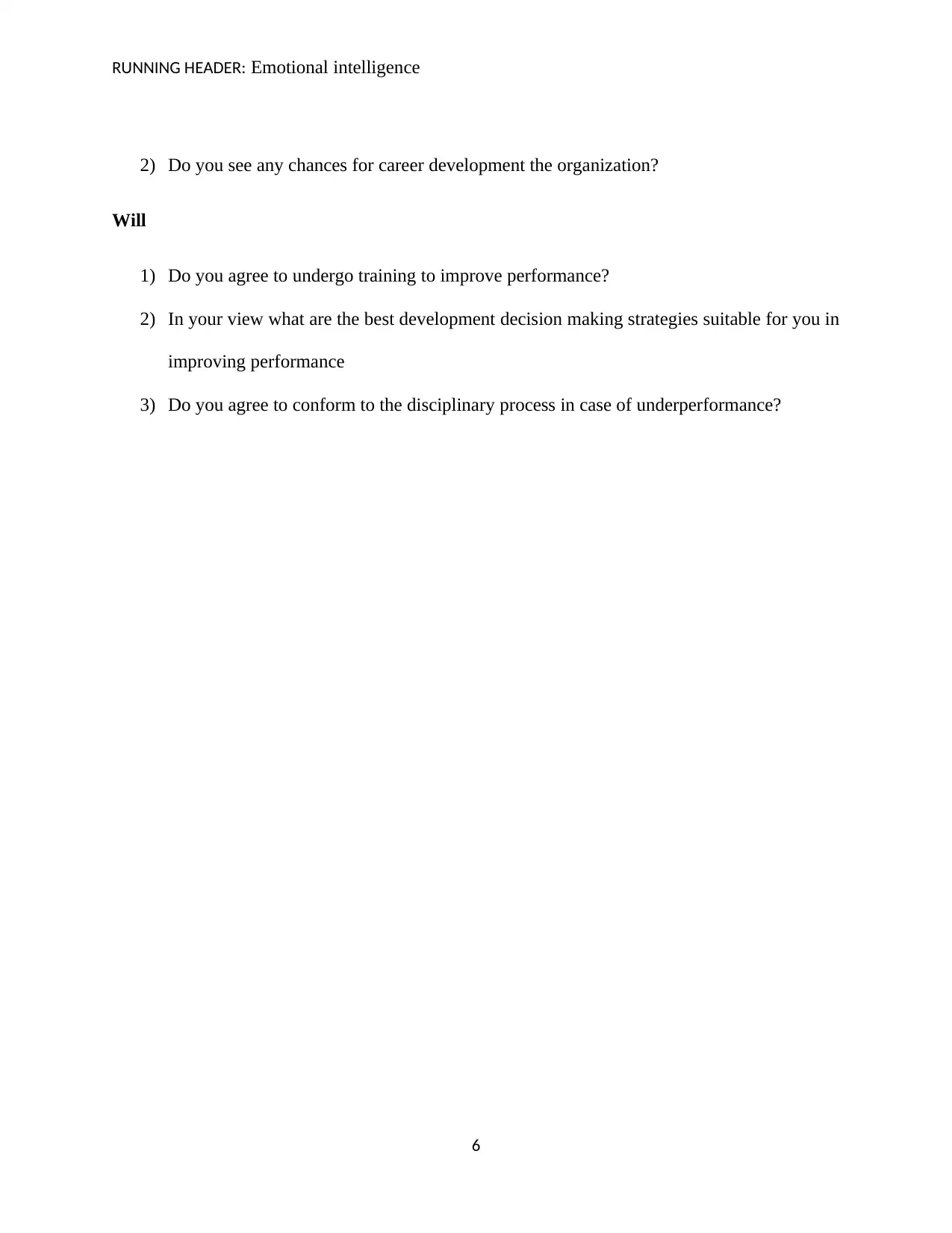
RUNNING HEADER: Emotional intelligence
2) Do you see any chances for career development the organization?
Will
1) Do you agree to undergo training to improve performance?
2) In your view what are the best development decision making strategies suitable for you in
improving performance
3) Do you agree to conform to the disciplinary process in case of underperformance?
6
2) Do you see any chances for career development the organization?
Will
1) Do you agree to undergo training to improve performance?
2) In your view what are the best development decision making strategies suitable for you in
improving performance
3) Do you agree to conform to the disciplinary process in case of underperformance?
6
⊘ This is a preview!⊘
Do you want full access?
Subscribe today to unlock all pages.

Trusted by 1+ million students worldwide
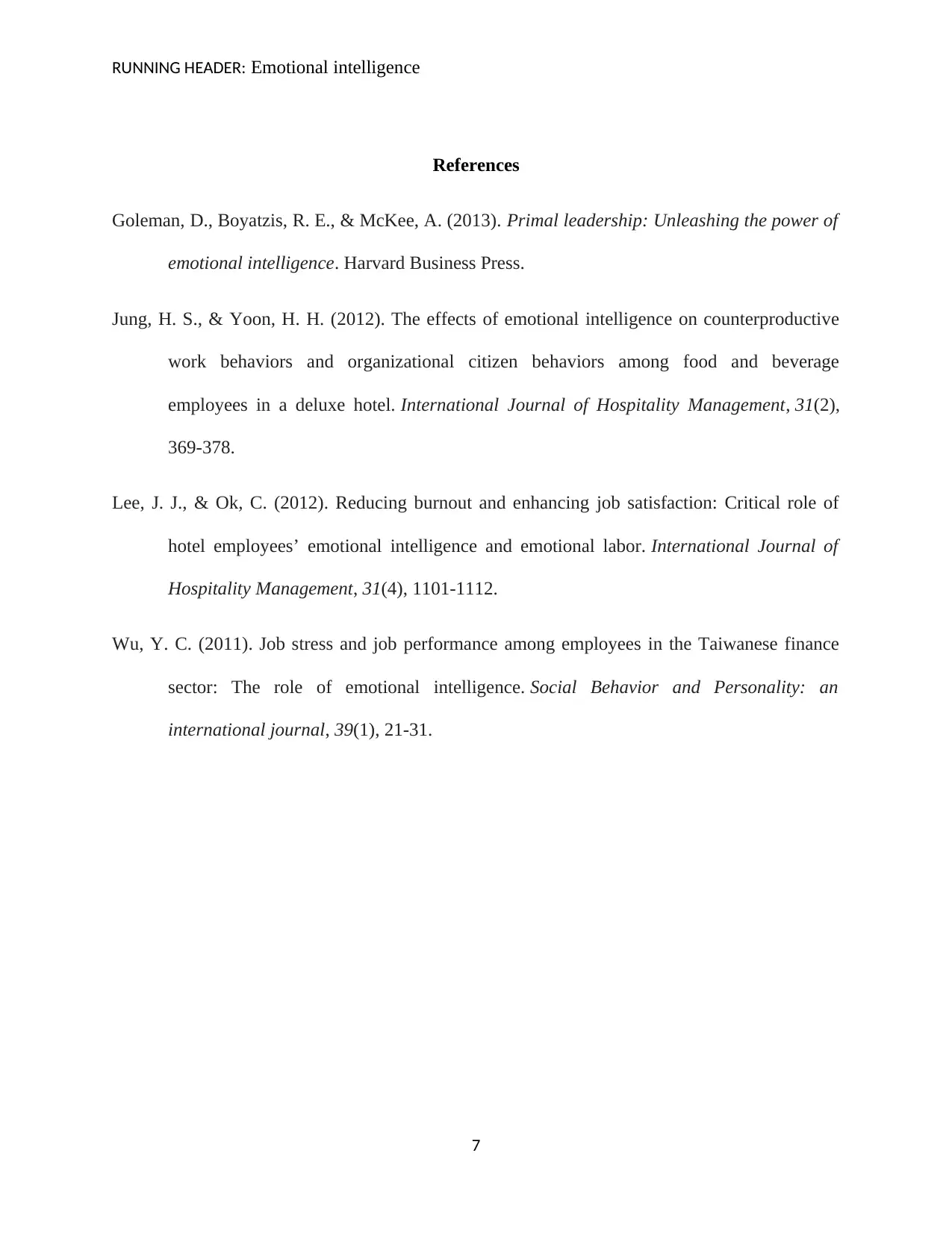
RUNNING HEADER: Emotional intelligence
References
Goleman, D., Boyatzis, R. E., & McKee, A. (2013). Primal leadership: Unleashing the power of
emotional intelligence. Harvard Business Press.
Jung, H. S., & Yoon, H. H. (2012). The effects of emotional intelligence on counterproductive
work behaviors and organizational citizen behaviors among food and beverage
employees in a deluxe hotel. International Journal of Hospitality Management, 31(2),
369-378.
Lee, J. J., & Ok, C. (2012). Reducing burnout and enhancing job satisfaction: Critical role of
hotel employees’ emotional intelligence and emotional labor. International Journal of
Hospitality Management, 31(4), 1101-1112.
Wu, Y. C. (2011). Job stress and job performance among employees in the Taiwanese finance
sector: The role of emotional intelligence. Social Behavior and Personality: an
international journal, 39(1), 21-31.
7
References
Goleman, D., Boyatzis, R. E., & McKee, A. (2013). Primal leadership: Unleashing the power of
emotional intelligence. Harvard Business Press.
Jung, H. S., & Yoon, H. H. (2012). The effects of emotional intelligence on counterproductive
work behaviors and organizational citizen behaviors among food and beverage
employees in a deluxe hotel. International Journal of Hospitality Management, 31(2),
369-378.
Lee, J. J., & Ok, C. (2012). Reducing burnout and enhancing job satisfaction: Critical role of
hotel employees’ emotional intelligence and emotional labor. International Journal of
Hospitality Management, 31(4), 1101-1112.
Wu, Y. C. (2011). Job stress and job performance among employees in the Taiwanese finance
sector: The role of emotional intelligence. Social Behavior and Personality: an
international journal, 39(1), 21-31.
7
1 out of 7
Related Documents
Your All-in-One AI-Powered Toolkit for Academic Success.
+13062052269
info@desklib.com
Available 24*7 on WhatsApp / Email
![[object Object]](/_next/static/media/star-bottom.7253800d.svg)
Unlock your academic potential
Copyright © 2020–2026 A2Z Services. All Rights Reserved. Developed and managed by ZUCOL.



